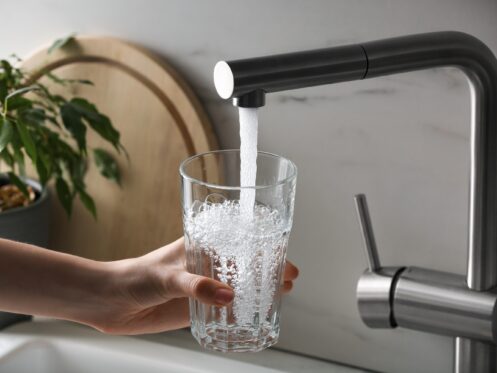You’ll likely notice if the water pressure drops in your Brighton, CO home. It’s hard to miss weak flow from your showerhead or kitchen faucet. But high water pressure is not so easy to spot, and it can strain your plumbing system and cause things like leaking pipes and damaged seals. A water pressure regulator can help by preventing high water pressure from damaging your plumbing.
What Does a Water Pressure Regulator Do?
A water pressure regulator is a pressure-reducing valve that reduces water pressure as the water enters your home. The water comes in through the main water line, and it’s always possible that the pressure is too much for the plumbing in your home. Pipes, washing machines, dishwashers, and other appliances that use water can wear out faster if they experience high water pressure too often. That adds up to a lot of cost in terms of kitchen plumbing repairs and replacements, new bathroom fixtures, and premature need for repiping.
How the Regulator Controls Water Pressure
If you look inside one of these regulators, you’ll see a small spring. Before entering your plumbing system, water must flow through the regulator. If the water pressure is too high, it puts pressure on the spring, which in turn reduces how much water can pass through the regulator. If you believe the water pressure regulator is making the pressure too low, a professional plumber from TYCO Plumbing can adjust the tension of the regulator.
Risks of Having No Regulator
Without a water pressure regulator, your plumbing is likely to deteriorate because of the constant strain of high pressure. A major example of what can go wrong is that your pipes can develop cracks. These cracks can cause even more trouble if they lead to water damage in your home. Dealing with high water pressure by installing a water pressure regulator is a better option than having to install new plumbing or repipe your entire home.
Does Your Brighton Home Need a Regulator?
If your home receives water from a city water system, then you likely have a regulator installed. Your home needs a regulator if the pressure [pushing water through your pipes is more than 80 pounds per square inch (psi). Ideally, water pressure in your home should remain in the 40-to-60-psi range. A plumber can check your water pressure, or you can use a pressure gauge with a garden hose adapter.
Where Does the Regulator Go?
A water pressure regulator installation goes near the main water shutoff valve for your home. If you think your home might already have a regulator, look next to the shutoff valve. If it’s not there, you can check in your basement or garage. If your home has a water meter, you can check near the meter as well. It gets cold in Brighton, so you could have a regulator installed in a warm or odd area to keep the regulator from freezing.
Water Pressure Regulator Issues
A water pressure regulator is great when it works, but things can go wrong. Knowing the signs of a bad regulator allows you to call for a repair or replacement as soon as possible. The following signs can mean your regulator has gone bad.
1. You Can’t Use Multiple Water Sources
The water pressure in your home might become unstable if the regulator stops working. For example, water might come from your kitchen faucet but not the faucet in the bathroom. But if you turn off the kitchen faucet and the bathroom faucet works again, that could indicate a problem with the regulator. You should always have the ability to use more than one source of water at a time.
2. The Water Pressure Is Unusually High
A broken water pressure regulator is unable to do its job, there might be a sudden spike in water pressure. For example, you might notice that water from your shower is much stronger than normal. If water pressure spikes, you can adjust the external screw on your water pressure regulator. If adjusting the screw doesn’t work, then the regulator is probably broken.
3. The Water Pressure Is Unusually Low
Sudden low water pressure is cause for concern. If the cold water has normal pressure when the hot water has low pressure, then perhaps your hot water heater or boiler is the problem. But if both the cold and the hot water suddenly lose pressure, it’s likely a problem with the regulator.
Contact TYCO Plumbing Today
High water pressure can do more damage than you realize. We’re ready to help if you need water pressure regulator installation or repair. We offer a range of plumbing services in Brighton and the surrounding area to help keep your plumbing flowing smoothly.
Call our professional plumbers at TYCO Plumbing today, and we’ll provide service as soon as possible.



